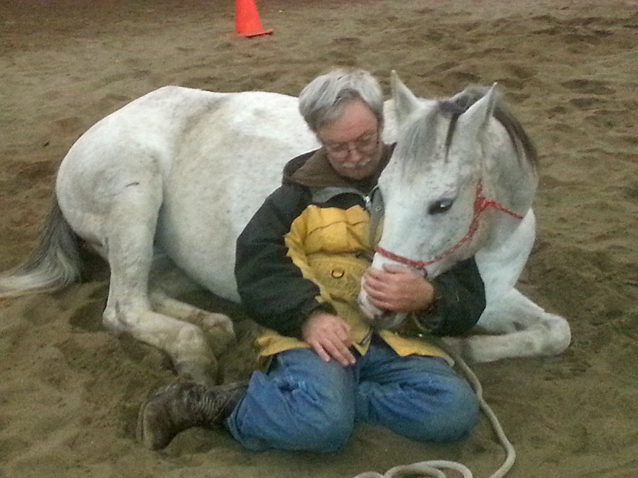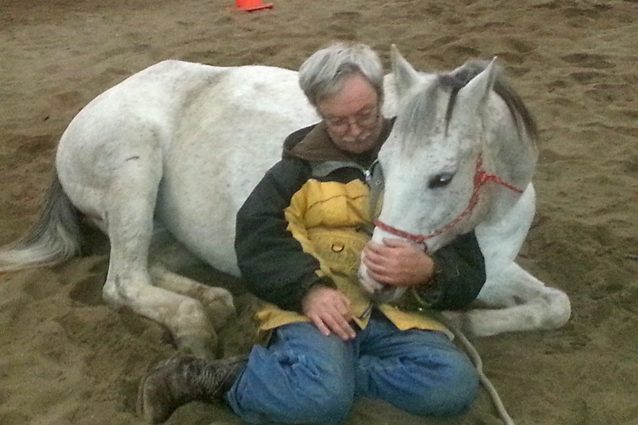
CFN – This Column of “Spirits in Unity” is being published by CFN for the community of Stormont, Dundas & Glengarry.
Thanks to all those who have approached me to say that they enjoy reading this column. Knowing that someone is reading the column encourages us to keep writing them.
This week’s Topic: Put the Relationship First
Understanding the type of personality of the person or horse you are presently dealing with is how you put the relationship first. You have to know what is important to your horse, what makes him tick, what his primary defaults are, what offends him, scares him or makes him argue and fight. The same goes for human relationships.
Introvert vs. Extrovert
The more similar your energy level is to your horse, the easier it tends to be to get on with them. You will break rapport with them when you are too slow for an extroverted horse, or go too quickly for an introverted horse, so adjusting the speed with which you do things is really not that difficult – unless you have trouble controlling the intensity of your own energy. If you are introverted you have to learn how to add more oomph to your physical presence and if you are more extroverted you have to learn how to bring your energy level down.
All true horsemanship masters have this incredible control over their energy, being able to intensify or to soften it from one moment to the next. But for most of us, we are too slow to adjust for horses. Their energy comes up and stays up too long, or it goes down and doesn’t come up again. When we learn to match our horse’s energy instantly, and in whatever direction it changes, pretty soon the horse will actually learn more self control. Why? Because it is usually the human who is causing the horse to be so slow, so crazy or so erratic. Just watch what happens when you leave and you’ll see the truth.
Right-Brain vs. Left-Brain
Right-Brain personalities in horses are naturally un-self-confident and tend to be submissive or defensive around other horses. Some are so defensive that it looks more like aggression, but their bark is worse than their bite. Have you ever experienced this in the human world as well?
Bubbles – A ‘bubble’ is that invisible shield around all organisms that acts as an early warning radar system. Try this with someone sometime. Pick a partner and ask them to stand and face you at a bit of a distance. Tell them to respond in any way they feel without hitting you of course. Approach the other person slowly, looking them directly in the eye. There should come a point when they begin to back away from you. That is when you touch the edge of their protective bubble. Depending on who the other person or horse it is that your are approaching you may discover that the bubble around you is larger (say when a stranger approaches) and smaller when a familiar face is approaching you (say a loved one).
Around horses these protective bubbles can be as large as an arena or as small as a hair’s breath away. And their size can vary in different situations as well. Right-brain individuals usually have big bubbles, are extremely perceptive and can be greatly disturbed by things that are not even close to them, such as another horse approaching them.
Right-brain individuals are looking for leadership so they tend to bond quickly. They get their confidence from their leader and they are easily influence by the emotional state of others – both horses and humans. Dealing with these types of individuals can be very challenging and a bit scary at times, but also extremely rewarding when those bonding moments come. Deep down they want to feel that special bond but often their overwhelming fear takes over and controls them. They can over time learn to overcome it and when they do they are the most endearing of all the personalities.
Left-Brain individuals are not looking for a leader. They are naturally self-confident and social and have a tendency to play dominance games with you and with other horses to challenge leadership. Because a Left-Brain horse is not looking for a leader, when he gets scared it can be a difficult situation to resolve, even more difficult than with a Right-Brain horse. That is because they don’t respect you, and now they don’t trust you either.
Remember that any type of personality can lose confidence as a learner and in a new environment.
Trust and respect are hard to get and easy to lose and that’s why a master puts the relationship first. A master knows that horse’s individual character, he know how to get, build and keep rapport and constantly strives to improve a horse’s confidence in all five areas:
1. Self-Confidence
2. Confidence as a learner.
3. Confidence in his leader.
4. Confidence in new environments.
5. Confidence among other horses.
This week’s photo features a student of mine and a horse named Morning Song. She is a left-brain extrovert. Recently, while Bill was just hanging out with Song, she decided to lie down. When she is feeling that she can trust her human partner, she will often drop and roll. But this is different. This time she just lay down beside Bill and he sat beside her. Her normal instinct would be to get up. But a gentle touch from Bill and she relaxed, stayed down and they spent a special time together. The normal training was put aside to enjoy a special relationship. This is the first time that she has exhibited this level of trust with anyone. It is a memorable moment for each of them and serves to strengthen their trust for each other and the concept of putting the relationship first.
This concludes the series on Confidence. It is a very important issue in dealing with horse or with humans and understanding how to encourage confidence in ourselves and others is really important in building strong relationships.
Next time I turn my attention to the ugly side of human-horse interaction, the ones who are willing to inflict pain or injury on their horse in order to satisfy their goals. Check out “Tongue Tied” next week.
Be sure to click on the ‘like’ or ‘dislike’ buttons to let us know that you have read today’s column. It is an honour to have you as a reader. I welcome any comments, questions or topics you would like me to discuss. I hope you enjoy reading about the wonderful world of horses.
In our ‘Spirits in Unity’ program we believe in developing a trusting relationship and a true partnership with a horse before even thinking about getting on his back. He probably prefers it that way too.
Whether you are just a horse lover, have dreams of owning a horse someday, or already have one, I hope these columns will give you some insight into the true nature of these magnificent creatures. I hope you will find them both informative and inspirational.
Until next time…
May all your dreams come true,
Garry “Horsetalker” Meek

